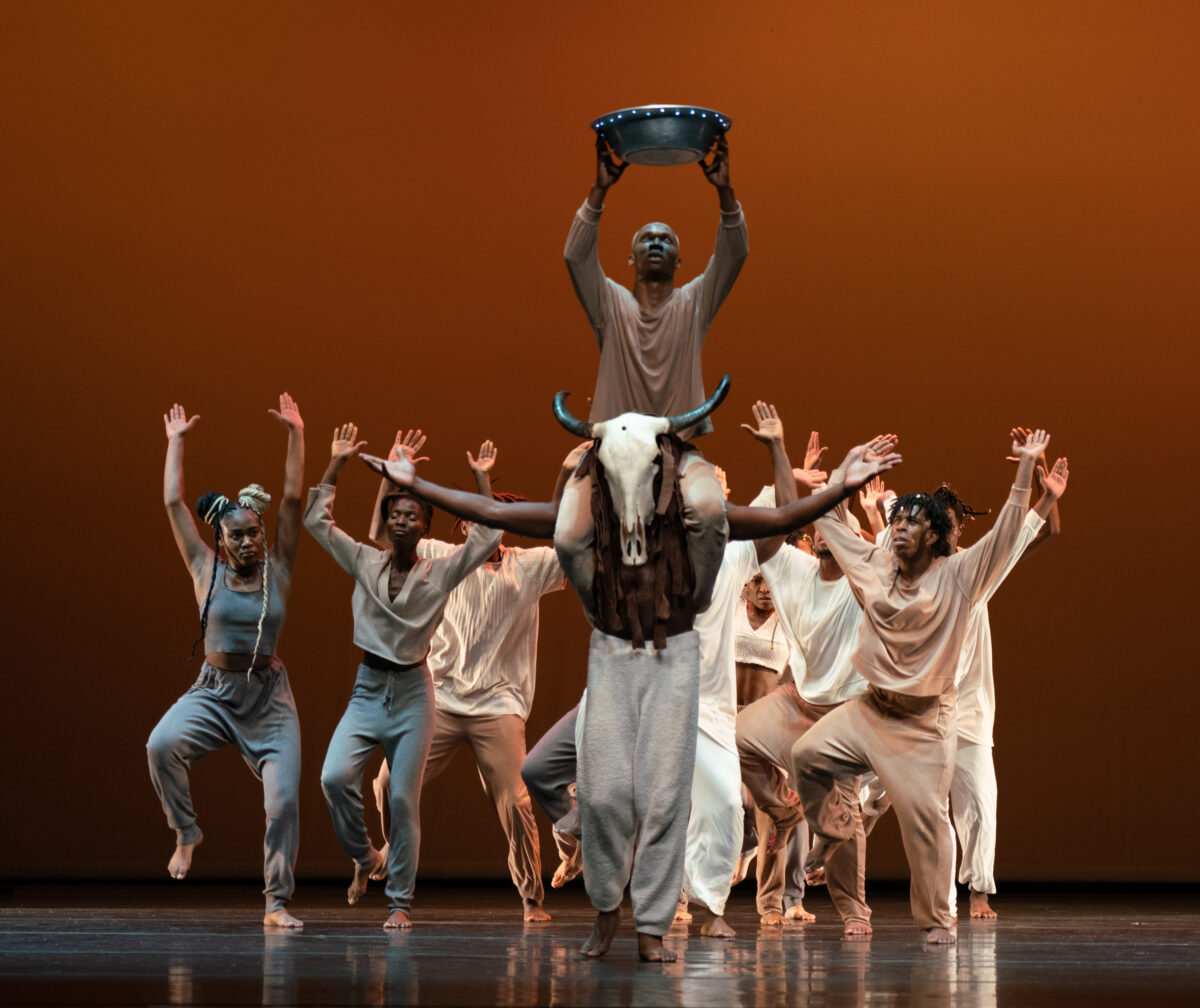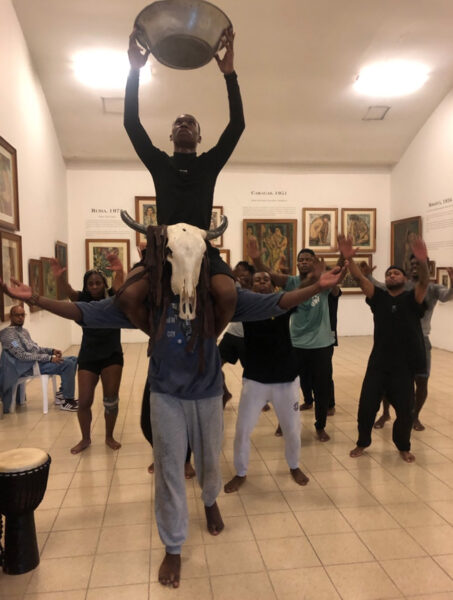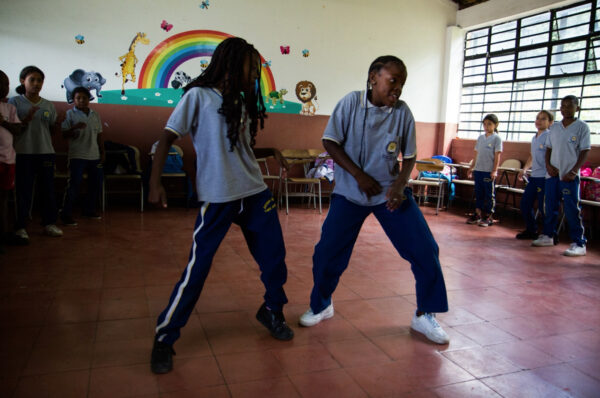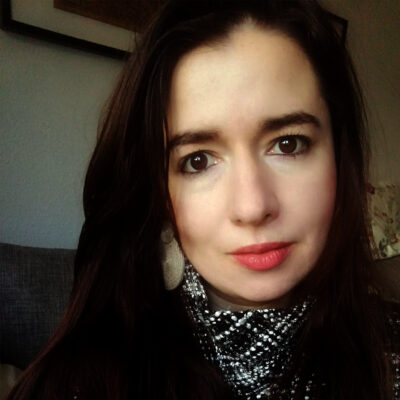
Colombia’s Sankofa Danzafro
María Camila Assad
“In this way, the voice of the ignored ones is amplified, people who for centuries have been considered objects of study claim, through dance, to be treated as subjects of knowledge to be heard and seen for the right to self-representation.”
Sankofa Danzafro is a dance company that creates new discourses through Afro contemporary dance as a means to revindicate the Afro-Colombian culture in Medellín and other regions of Colombia. Sankofa is a term taken from Ghana, a western African country, which means to return to African roots, traditions and ancestral knowledge in order to face the present and to transform the future. The same meaning was adopted for the dance company to vindicate the value of the subjectivities of Afro-Colombian people and their racialised bodies in the collective environment. In Sankofa´s philosophy, dance is not a way just to be seen but to be heard. Therefore, the company is more than a space for dance training, it is a space for researching, knowledge creation, reflection and consolidation of Afro culture in Colombia through Afro contemporary dance.
Strategies include:
- Interdisciplinary collaboration
Sankofa Danzafro works with the government, academic institutions, foundations, corporations and other dance companies on their projects to create positive and impactful change in territories around Colombia mainly inhabited by Afro-descendant people. -
Providing dance educationThrough dance education, Sankofa Danzafro redefines Afro-dance to incorporate Afro-Colombian culture and dance traditions and also focuses on important social issues such as racism, gender inequalities, and racial stereotypes around Afro-dance.
-
Staging groundbreaking productionsSankofa Danzafro has been creating impactful productions since 1997 to represent their philosophy and pedagogy. The City of Others is their most well-known production and has been performed in national and international cities since its creation in 2010.
-
Undertaking collective research
The company actively participates in research and has joined the research team of the CARLA project in Colombia to fight against racism and support decoloniality
- Community projects to strengthen community resilience
Sankofa Danzafro works in alliance with many organisations to run life-changing initiatives to benefit the Afro-Colombian communities in the country.
Sankofa Danzafro was founded in 1997 by Rafael Palacios. The dance company is a project that goes from the political position to the aesthetic features and conceives dance as a sacred place, a place of rebellion and resistance for the Afro community through embodied knowledge. It is dedicated to dance training, creation in dance, pedagogical projects and research processes around Afro culture and dance in Colombia. It is also a place of social connection, personal growth and positioning of Afro-local cultures in the national dynamic.
Interdisciplinary collaboration
Sankofa Danzafro collaboratively implements its many projects with governmental, non-governmental and academic sectors. They have built working alliances with the Ministry of Culture of Colombia, foundations, corporations, universities and other dance companies on various projects to benefit the Afro communities throughout the different territories in Colombia.
Providing dance education
Sankofa Danzafro is a learning and research space where neighbourhood and community knowledge are articulated with the academic dimension.
Sankofa Danzafro, through Sankofa Mi Universidad (‘Sankofa My University’), has embraced a pedagogical strategy beyond merely teaching dance techniques to achieve virtuosity. Instead, dance must be charged with subjectivity and the collective experience of the community, so that the body becomes an engine of social change for the vindication of the rights of racialised bodies.
Sankofa Mi Universidad offers dance training based on four approaches:
- Dance, anti-racism and decoloniality: The concept of race is explored to understand the problems of racism in the daily lives of those who suffer from it. Sankofa Danzafro’s research projects are mainly carried out in this area.
- Gender and production of femininities and masculinities: The pre-conceived assumptions of gender by Colombian society are addressed via dance exploration.
- Culture of collective self-care: Collective organisation and self-knowledge is emphasised through dance with a focus on community resilience.
- Creative processes, movement and exploration: Different Afro contemporary dance techniques are explored, with a focus on Afro-Colombian dances which incorporate traditional and urban dance styles.

The creation process of Ancestros del Futuro. Photo credit: Diego de los Ríos.
Staging groundbreaking productions
Sankofa Danzafro stages their own productions to represent their philosophy and pedagogy. They have produced 34 productions to date from 1997 to 2022. One of their most well-known productions is La Ciudad de los Otros (‘The City of Others’) which has been performed in national and international cities since its creation in 2010. This production is focused on the lack of opportunities for those in Afro and marginalised communities who have been marked by ethnic discrimination and social inequality. This work was created with the support of the Mayor’s Office of Medellin Afro-Colombian Integration House in the framework of the celebration of 159 years of the abolition of slavery.

Sankofa Danzafro’s well-known production, La Ciudad de los Otros (‘The City of Others’). Photo credit: Marcela Gómez.

Ancentros del Futuro being performed on stage. Photo credit: Marcela Gómez.
Undertaking collective research
Sankofa Danzafro is part of the research team in Colombia for the research project Cultures of Anti-Racism in Latin America (CARLA) of the University of Manchester, United Kingdom. The project has enabled indigenous and Afro-Colombian artists to take part in cultural productions that fight against racism and the colonial matrix and develop a common research agenda.
The dance company has also developed two processes of research creation with the community of dancers and artists in territories: in 2021 and for 21 days, the members of Sankofa Danzafro remained in an artistic stay in the Municipality of Tumaco in Colombia (Colombian Pacific region). As a result, they created Behind the South: Dances for Manuel. During 2020, Sankofa Danzafro developed the Laboratorios de Creación en Casa (‘Common Creations Laboratories’) workshops which were aimed at strengthening community processes. Artists-trainers of Sankofa Danzafro generated dance spaces for the reflection of ethnic and social identities. They also provided tools and knowledge on dance techniques, warm-up and preparation of a class and creative exploration for choreographic performance.
Community projects to strengthen community resilience
Sankofa Danzafro works on pedagogical projects which integrate children and the youth of African descent between 11 and 18 years old in ethno-educational spaces to create shared spaces of reflection, exploration and creation through dance. The corporation’s community-based projects have been effective and has benefitted Afro-Colombian populations throughout the country. “In this way, the voice of the ignored ones is amplified, people who for centuries have been considered objects of study claim, through dance, to be treated as subjects of knowledge to be heard and seen for the right to self-representation,” says Rafael Palacios. These include:
Red de Danza (Dance Network)
The Dance Network is a project created by the Mayor’s Office of Medellin in 2014. Sankofa Danzafro was invited in 2021 to develop workshops for children and adolescents aged 8 to 18 from working-class communes of Medellín to experience and learn Afro-descendant dance as a way to self-reflect and build their own identity and social values in a city that historically treats them as foreign.
Jóvenes Creadores del Chocó (‘Young Creators of Choco’)
Sankofa Danzafro has worked in collaboration with the Jóvenes Creadores del Chocó corporation (with the support of Visible Hands corporation and the Ministry of Culture of Colombia) to develop a project that brought to the stage a traditional Afro-dance technique known as Exotica. The work is known as Revolución Pazifica (‘Peaceful Revolution’): Dances of Resistance has been presented in important venues in Bogota, Medellin, Brazil and France.
Pasos en la Tierra (‘Footsteps on the Ground’)
This was a pedagogical-artistic project that took place between 2008 to 2013 with the collaboration of many stakeholders which included the Ministry of Culture of Colombia, universities (Universidad del Valle, Universidad del Pacífico, la Universidad Tecnológica del Chocó Diego Luís Córdoba UTCH), two embassies (France and the US), local NGOs (Casa Tumac) and two local mayors’ offices. This project undertook a route through Afro communities in different regions of Colombia and the Pacific Coast, Chocó and Urabá, and its objective was to consolidate and differentiate Afro culture in Colombia through dance.
The process involved about 900 participants among teachers, group directors, dancers, children and youth, musicians, managers and other cultural agents related to dance. Pasos en la Tierra created live knowledge spaces through encounters, connection and dialogue between different Afro communities of Colombia where participants could remember their origins and traditions and also reflect on Afro dance and its everyday impact in the territories, with the perspective of forming a future based in the cultural and ancestral references that built them as a community.
Los Silencios del Tambor (‘The Silence of the Drum’)
This project was developed in 2015 in the region of Providencia in Colombia and involved more than 20 artists of the island, who in this staging, made a tribute to their culture, songs, language, ancestral knowledge and African roots. The project was developed with the support of the Department of Dance and Entrepreneurship of theMinistry of Culture of Colombia and its objective was to strengthen and make visible the traditional dances of this Colombian region composed mostly of people of African descent. This project featured a choreographic laboratory in which the local artists were able to bring to the stage a work imbued with their culture, roots and aspirations for the future.
Narraciones Afrodiaspóricas con Sansacroma y Sankofa
(‘Aphrodiasporic narratives with Sansacroma and Sankofa’)
This project is another example of the collaborative work developed by Sankofa Danzafro. And was an artistic internship thanks to the Ibero-American Performing Arts Festival MIRADA 2018 in Santos, Brazil with the Company Sansacroma.
The project was an ancestral encounter of black artists belonging to two Afro-Latin American dance companies, Sankofa Danzafro from Colombia and Sansacroma from Brazil. This encounter was created to provide learning on how Brazil has consolidated an Afro culture with strong elements of reference from the African diaspora that has contributed to the construction of its own identity that strengthens its connection with Africa. It was a very remarkable and pedagogical experience for Sankofa Danzafro’s artists who learnt about the process and impact that Afro cultures have in Brazil..

The children of the Santo Domingo neighborhood in the current dance workshop taught by Sankofa Danzafro’s trainers. Photo credit: Diego de Los Ríos.
Camila Assad
| Camila Assad is a cultural manager at the Universitat Internacional de Catalunya, Barcelona, Spain where she manages special projects at the Metropolitan Theatre of Medellín. With more than eleven years of experience working within the cultural and educational sector in Colombia, Camila has worked as an adviser for cultural projects for the Municipality of Medellín including developing cultural audiences as well as designing, planning and executing cultural programs for the creative and cultural economy of Medellín. |
What is the Imagine Around the World Project?
A partnership with the British Council Australia, the Imagine Around The World Project aims to document case studies from numerous countries outside of US, UK, Canada, Australia and New Zealand to share best practice and leadership in cultural diversity, cultural equity and inclusion in the arts, screen and creative sectors. This project is managed by Diversity Arts Australia and supported by Creative Equity Toolkit partner, British Council Australia. To find out more click below – or read the other case studies as they go live here.

